- Home
- Chuck Palahniuk
The Invention of Sound Page 12
The Invention of Sound Read online
Page 12
It was into this unforgiving peanut-free world that she had gone each day. And in exchange for every treat they’d loved and lost, the still peanut shell-shocked students of the sixth grade got a new classmate by the name of Lawton Taylor Koestler.
Blush pulled a who-cares? face. “He was a regular kid. Nothing two-headed about him.”
The only thing not to like was the kid’s mother, Mrs. Koestler, who accompanied her son to class on his first day and asked to speak to the kids in his grade. The teacher asked Lawton to step into the hall.
Her son was a very sick boy, Mrs. Koestler told Blush and her classmates. Deathly allergic to almost everything. But peanuts especially. And it was the responsibility of every boy and girl to ensure that Lawton never be exposed to peanuts in any form or, for that matter, any food that had been processed or packaged in any facility that dealt with peanuts. And she described, this Mrs. Koestler, how the tiniest particle of peanut enzyme would spur a full-body immune system reaction. Lawton’s lungs would quit working. His tongue would swell to suffocate him.
“There was no Mr. Koestler,” Blush said. “No wonder. The woman was a harpy.”
Blush pulled a handful of her hair near her face and began to pick through the strands, frowning when she found a gray one. “He made a basket from center court once, three points, and that alone should’ve made him popular, but his mom was a disability no kid could’ve got past.”
At times she’d stop mid-story. She’d get up and go to the touchpad and shut off the air. In the absence of the humming fans and blowers she’d listen as if she’d heard someone enter the house. They were walled in. Safe from nuclear attack, and she was nervous about a burglar. During these tense silences the air would grow warm and damp with their breathing.
After a spell of listening, listening and thinking, she’d activate the air-conditioning and settle back in her beanbag chair. At these pauses she seemed to be debating how far to tell this story.
She asked, “Have you heard of Munchausen syndrome?”
Foster nodded. “A person tells fantastic lies. Usually about his health, right?”
She smiled at a memory. “He came to our house for dinner one time. Did not eat a bite. I could tell he was terrified of the food. My mom felt sorry for him.”
The problem, her father told her, wasn’t just peanuts. It could be wasps. Bee stings. A friend of his had been riding a motorcycle and caught a bee in the face. He’d never been allergic, but now his cheeks had begun to swell. The guy’s vision blurred, and his throat swelled shut. All while still zooming along at freeway speeds. This friend of her father, he’d steered for the shoulder and braked hard, and even then he saw his own death, saw the real world disappearing and felt the motorcycle skid and topple onto the gravel. Blind and suffocating, he fell. A terrible pain shot up his leg, yet he didn’t die.
As doctors explained it, Blush’s father said, the cycle’s hot tailpipe had burned the man’s leg. Burned it to the bone. And the subsequent rush of natural adrenaline had stopped the allergic reaction. For the rest of his life, the man walked with a limp, but at least he had a life.
It had been her father who’d suggested Munchausen’s by proxy. Blush and her father had been washing dishes after the meal. After Lawton Koestler had gone home hungry. Munchausen’s by proxy was a mental illness and a form of child abuse. It prompted a parent to convince a child that he was frail. That he was allergic to everything or had a debilitating disease. It had been a lot for her eleven-year-old brain to grapple with.
“I thought I could cure him,” said Blush.
She rolled onto her side, scrunching the beanbag, so she could look straight at Foster. “I haven’t always been eaten alive by creatures from outer space, you know. I was raised in Idaho.” She nodded as if to assure him she wasn’t lying. “Mountains. Geodes.”
As a kid she’d been hiking and camping every free moment. “I didn’t grow up wanting to be hacked to pieces by an axe murderer.” She’d wanted to be a gemologist.
Foster laughed. “Really? A gemologist?”
“Don’t laugh,” she laughed. “Idaho is called the Gem State.”
Still laughing, he said, “Sorry, I’m sure you’d make a great…” He couldn’t say it with a straight face.
She said, “I knew schist and basalt and talus slopes.” She was a scientist at heart. So she talked Lawton into going on a hike one Saturday, just the two of them. She packed her own lunch. His mother packed him something nut-free and gluten-free, something non-soy and lactose-free. “And we took off on the trail to the top of Beech Mountain.”
She looked at Foster without speaking. The moment stretched as if she were testing him. This was a trial to see if he’d interrupt and change the subject, or if Foster was actually listening and engaged in her story. He allowed the minutes of silence to pass.
She said, “Don’t laugh, but I used to know every bird on sight. I knew their songs, too.”
Foster didn’t laugh.
“I was such a Disney princess, too.” She rolled her eyes at the memory. “The way Prince Charming woke Sleeping Beauty with a kiss, that’s how I planned to rescue Lawton Koestler.”
She’d eaten a peanut, a handful of Spanish peanuts, at breakfast. When they arrived at the peak of Beech Mountain, she’d caught him around the waist and kissed him on the mouth. She’d felt his body go stiff, but the longer she kissed him the more he relaxed, until he was kissing her back. The kiss lasted until they had to step away from each other and gasp for air. Forests and meadows rolled off in every direction. Eagles circled below them, they were so high in the mountains.
“It turned out like the other story—the Snow White story—especially the part where the witch makes Snow White bite the poison apple.” Her kiss had been nice. A nice kiss. They’d kissed a second time, and his mouth had a milk taste, like boys who are good at sports taste. She didn’t say anything, not right away, but she was thrilled. She hadn’t cured him, but she’d proved he wasn’t sick to begin with.
She’d planned to tell him he wasn’t sick as soon as they got home. He wasn’t weak. He only had a crazy mother is all.
Again Blush Gentry waited in silence. Testing Foster’s attention. Maybe wishing he’d interrupt and redirect the conversation to the theater collapse, the crowdfunding, something safe.
When he did not, she continued, “We hadn’t come down the trail a few steps before he started to wheeze…”
He had a pen, a kind of needle he carried in order to inject himself if he had such a reaction. But it was late October with no bees around and certainly no peanuts to worry about, and he’d left the injection pen in his jacket in Blush’s family car when they’d been dropped off. On a day this warm, he didn’t figure to need a jacket.
Events unfolded pretty much the way his mother had predicted. His face turned meat red and the skin swelled around his eyes and mouth. He looked like a stranger who couldn’t breathe, clawing off his shirt and clawing at his skinny red chest and arms.
She tried to cover him up, to keep him warm, but more embarrassed by his nakedness and distress. As if she could hide the damage she’d done simply by keeping his clothes on him. When she’d suggested running down to get help, he’d grabbed her hand and begged. The trailhead was miles, hours away, and there was no guarantee her father would already be waiting.
“He asked me not to leave him,” she said. Lawton thought he was going to die. His breathing was a whistle through the raw swelling inside his throat. He knew he was going to die, and he didn’t want to die alone.
She helped him stretch out on the pine needles and hoped that position would help. It would be like an epileptic seizure, she hoped, and he’d return to normal after a bit. But his eyes began to swell shut and his mouth gaped wider as he tried to draw the next breath. His chest heaved, held the air, and blew it out with a cry, each exhale erupting with specks of blood from his burning throat.
Sunk in her beanbag chair, Blush waited now in silence as if aski
ng Foster’s permission to complete the horror. No longer was she telling a sweet story to entertain him and explain herself. Now she’d be sharing a burden that he’d struggle to carry for the rest of his life. She’d inflicted something and waited to hear his acceptance or rejection of it.
“Lawton’s eyes were swollen shut, but he raised an arm and whispered, ‘Dad.’” His swollen purple lips had twisted into a smile, and he’d tried to sit upright even as Blush pushed to hold him flat on the ground.
“It’s my dad!” he insisted, gasping. “He’s here to rescue me!”
Some words, Foster wished he could see coming. Dad, for instance, left him gut-shot. His belly couldn’t hurt more if someone had designed this story to torture him.
The eleven-year-old Blush saw nothing. The trail stretched empty in both directions. They wouldn’t have daylight for much longer, but she couldn’t bear to leave him to die in the dark. A blinded sixth grader facing death by himself in a dark forest.
It didn’t occur to her that she might soon be a sixth-grade murderer alone with the dead body of her victim in those woods at night.
That’s when her father’s words came back to her. About the motorcycle and the bee sting. Little Blush, she fumbled a book of matches out of her backpack. She slipped off one of Lawton’s shoes and socks and rolled up the pant leg to expose the skin where a scar wouldn’t show for the rest of his life. She was so sure she could save him. Instead of being a Disney princess, now she was someone out of Hans Christian Andersen. The Little Match Girl. And instead of bringing comfort, when she lit each match and held the flame to Lawton’s leg, he screamed.
Foster slugged back his drink and helped himself to another.
Instead of saving Lawton, each match brought the stink of sulfur and scorching flesh. The skin of his ankle blistered and split. Split and hissed. Hissed and sizzled.
Desperate, she lit the whole pack and tortured him until the flames sputtered and left them in total darkness: The Little Match Girl and her victim.
In lieu of saving Lawton Koestler more, Blush Gentry sat beside him and held his hand. “My dogs,” he raved hoarsely. “Oh Dad, oh Daddy!” Nothing approached. Only the wind rose in the trees as the daylight faded. Leaves were sifting down to half bury them in a layer of dirty yellow.
Lawton Koestler calmed. His wheezing breath slowed. He asked, “Can’t you see them?”
Blush could see nothing. The night settles fast in the mountains, and she might die as surely as Lawton was dying if she stayed too long in the open as temperatures fell.
In the panic room, her words broke and she swallowed them and went quiet for long stretches. From this point she spoke as if it didn’t matter whether or not Foster was listening.
“He told me that his father had died from the same allergy,” she said. And that Mr. Koestler had come to meet his son and escort his son to the next life. Likewise, dogs were present. Family dogs that had died when Lawton was barely walking, but they, too, had come to guide him and give him comfort.
In Foster’s mind flashed the mysterious girl in the security video, who seemed to be leading his Lucinda away to safety, but in all likelihood to her doom.
All this time the young Blush Gentry, that wannabe gemologist, she had held Lawton’s hand, even as it grew colder and his breathing grew fainter. She wanted to confess about the kiss, about eating peanuts before the kiss, and about Prince Charming rescuing Sleeping Beauty, but she couldn’t interrupt his talking about dogs she couldn’t see or a father who wasn’t there. His hand around hers hardened into a manacle, and he was too heavy to budge. She was a girl who knew how the wind in the trees all night could sound like someone coming to the rescue. And how, at the same time, it could sound like a mountain lion coming in for the kill.
Defeated by her own story, Blush said, “That’s why I allow alligators to tear me apart, naked.” And reached for her own glass of rum and Coke.
Mitzi reached for the gold cuff links set with rubies.
Schlo told her, “Not those. God forbid.” He said, “I want my son should have those.” He held a martini and sloshed it to indicate a pair set with green stones. “If you please, I’ll wear the malachite.”
The cuff links, as well as various tie tacks and tie bars, not to mention the extra studs to his tux shirt and the flower for his lapel, were displayed on a velvet-lined tray atop the bureau in his bedroom. As she reached for the malachite ones, Mitzi caught sight of herself in the bureau’s mirror.
With a finger pointed at the tray, Schlo said, “Not the Piaget, either. I’ll wear the Timex, just in case.”
There in the mirror was a woman in her late twenties, possibly thirty years old. Her blonde hair was growing a shade darker. Her round face had thinned, giving her wide cheekbones and accentuating her eyes. She was getting her looks back. Pregnancy would do that. She asked, “Do I look like a killer?”
In the mirror, Schlo shot her a look. “Don’t brood,” he said. “You who couldn’t kill a fly?” He tugged back the sleeve of his jacket and offered a hand.
She folded back the French cuff of his shirt and matched the holes. Slipped the cuff link into place and opened the toggle. She reached for the other cuff.
He looked at her as if gauging whether this was a story or a confession. And was this something he wanted to hear? He grinned. “Don’t make me laugh or I’ll sweat.” He shifted his bulky torso inside the tuxedo jacket.
She worked the second cuff link into place. This she could remember doing for her father on special nights like tonight. The Academy Awards ceremony, such a night. And one time she’d actually gone with him, her father, but not a second time. Never again. Not after everyone seated around them had risen and left the auditorium. Their neighbors had decamped to watch events from the lounge, on the television screens in the bar. And when the placeholders, those dressed-up aspiring actors had filled the empty seats, when even those camera-ready nobodies had stood awkwardly and slinked away, then Mitzi Ives had felt shame as only a child can suffer shame. She’d known the television cameras would never swing her way, not and risk revealing a small field of empty seats in the audience otherwise packed with Hollywood luminaries.
No, Mitzi had never again begged her father to take her. But his cuff links she’d done, and his bow tie she’d learned to tie. And tonight the same she was doing for Schlo.
The bedroom television showed the crowds currently outside the Dolby Theatre. The tiered seating that lined the red carpet, and the camera crews stationed at intervals to interview the arriving guests.
“Your father,” Schlo said, glowering at his reflection in the mirror, “him I could see as a killer.”
Mitzi flipped up the tabs on his shirt collar and looped the tie around his neck. She crossed the two ends under his chin and tried to balance the loops.
The scream movie had been nominated for Best Sound. Not nominated due to being something good, but nominated due to politics and how the industry needed to prove they hadn’t launched a horror flick that had already smashed dead with concrete almost three thousand teenagers if you combined the Imperial with what had happened in Detroit. Call it snow load or a tiny, one-city-block-sized earthquake, the reporters were reporting whatever the people who owned the news told them to report.
Not every screening had ended in disaster. Plenty of showings in other venues had been uneventful, but two was pattern enough to scare most people away from theaters.
Tonight, all of Tinseltown was turning out, conscripted as human guinea pigs. In one big act of faith, they’d watch the scream segment together, all the stars attired in their loaned designer finery and jewels. Just to prove to the world that moviegoing was safe.
Still, Schlo’s wife, she complained she had a backache just to stay home. And Schlo, he wasn’t wearing the ruby cuff links. Or the Piaget. His son, Schlo’s son, was downstairs, down in the basement, forbidden to attend tonight. Mort, a boy still in Cub Scouts, weeping his heart out.
With the bow tie Mi
tzi fussed. Getting the two loops balanced. Getting it tight so as to stand up, but not so loose it flopped forward. She said, “Did I ever tell you about the time I was a hero?”
It was a story she’d never told but felt safe telling him. Particularly tonight, before he walked the plank. He and all of Hollywood were walking up that red carpet, smiling and waving while knowing they might be marching into a mass grave. Mitzi could risk telling Schlo. “I tried to help a little girl.” With her fingertips she smoothed the lapels of his tux. “I met her in a building, downtown, where she was lost.” Mitzi plucked the flower from the velvet tray and pinned it in his buttonhole. A gardenia it was, simple and white and sweet smelling. “I was twelve, and the girl, this lost girl was seven years old. I didn’t know what else to do.”
Amid all the machinations of her styling, she felt like a mortician. How a mortician must feel primping a dead body.
Schlo slipped a wallet from his back pocket. He took out a couple credit cards and all the cash and left them on the dresser. The wallet he tucked back in his pants, empty except for his driver’s license.
She dug into her bag for a small handful of pills and held them cupped in her hand. Schlo pinched up two and downed them with a dash of martini. He pinched up two more and choked them down with the last of his drink. “Now, tell me.” He was loose, magnanimous, a generously stoned man beaming over her as if she were his daughter. “How were you the hero of this little lost girl?”
The worst she couldn’t tell him, not while the hired car waited to take him to the theater. Why burden what might be his last hours?
Instead Mitzi lifted a comb from the bureau and straightened the part in his hair. She ran the comb over the sides and back of his head. She said, “I took the little girl to meet my father.” A speck of dandruff she flicked off his ear. She leaned close and shined each of the studs on his shirt, using her breath and a tissue. “I thought my father could help her.”
On television the first of the cars were already arriving at the gateway to the theater. Climbing out and traversing the red carpet were already the first arrivals, looking blue-lipped, looking eyes-dilated from whatever sedatives would get them past their fear. This staggering parade of bejeweled zombies. All of Hollywood royalty, lurching along the red carpet and smiling lazy, crazed, drooling smiles.

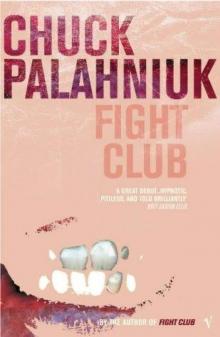 Fight Club
Fight Club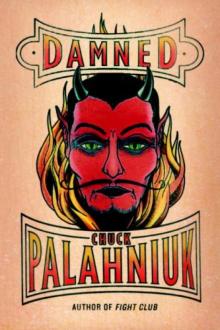 Damned
Damned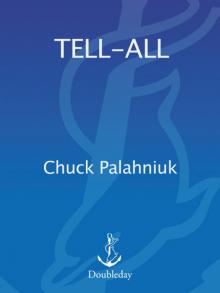 Tell-All
Tell-All Choke
Choke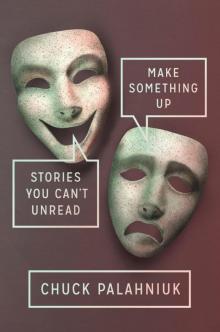 Make Something Up: Stories You Can't Unread
Make Something Up: Stories You Can't Unread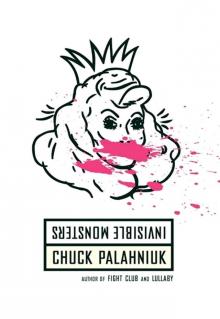 Invisible Monsters
Invisible Monsters Phoenix
Phoenix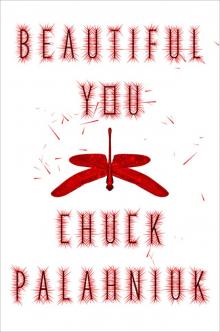 Beautiful You: A Novel
Beautiful You: A Novel Haunted
Haunted Survivor
Survivor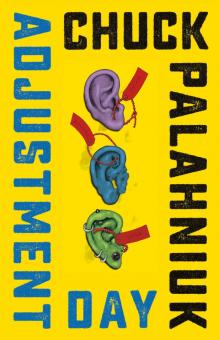 Adjustment Day
Adjustment Day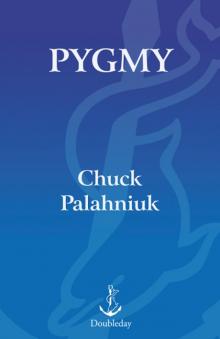 Pygmy
Pygmy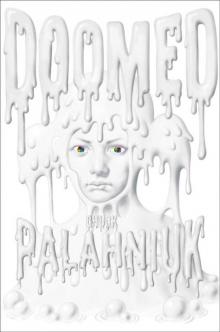 Doomed
Doomed Lullaby
Lullaby Snuff
Snuff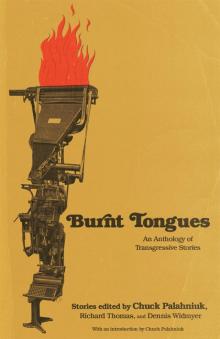 Burnt Tongues
Burnt Tongues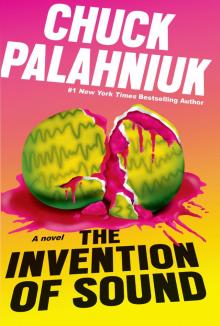 The Invention of Sound
The Invention of Sound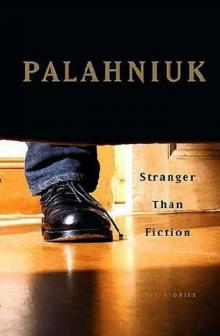 Stranger Than Fiction (True Stories)
Stranger Than Fiction (True Stories)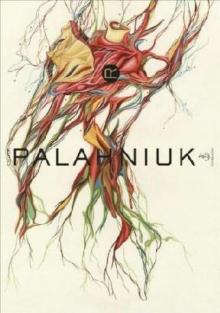 Rant: The Oral History of Buster Casey
Rant: The Oral History of Buster Casey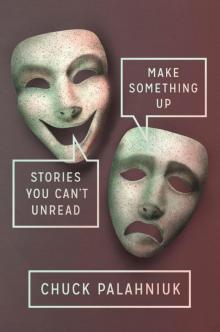 Make Something Up
Make Something Up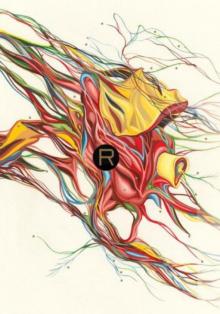 Rant: An Oral Biography of Buster Casey
Rant: An Oral Biography of Buster Casey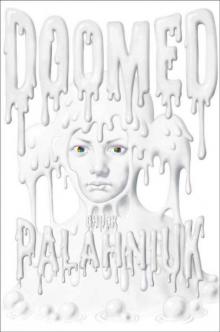 Doomed d-2
Doomed d-2 HOPE AND GORY
HOPE AND GORY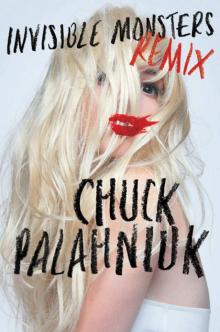 Invisible Monsters Remix
Invisible Monsters Remix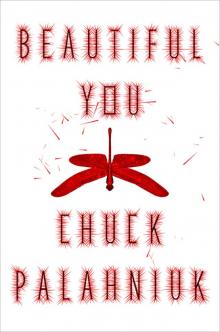 Beautiful You
Beautiful You Fugatives & Refugees
Fugatives & Refugees